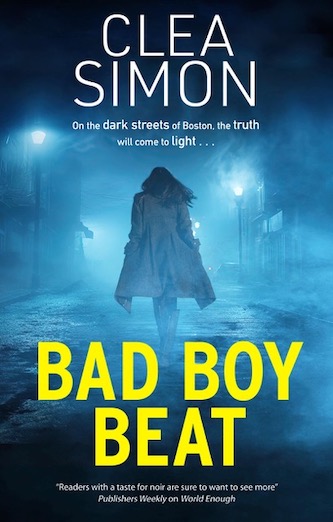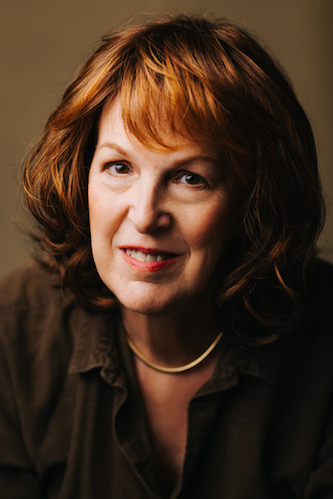Author Interview: Clea Simon on Her Latest Mystery Novel — “Bad Boy Beat”
By Brett Milano
Clea Simon’s latest mystery, Bad Boy Beat, features the memorable heroine Em Kelton, a tough Boston journalist who can mix with the hard-boiled reporters and hard-living cops on her beat — none of whom want to realize that she happens to be a brilliant detective.
 I’ll admit right here that I am not much of a mystery fan, but I am very much a Clea Simon fan. And I swear this has nothing to do with our longstanding friendship, or the fact that our writing paths have occasionally intersected over the years. It’s more about her knack for poetic language and vivid characters, and the narrative invention that she brings to her now-extensive catalogue.
I’ll admit right here that I am not much of a mystery fan, but I am very much a Clea Simon fan. And I swear this has nothing to do with our longstanding friendship, or the fact that our writing paths have occasionally intersected over the years. It’s more about her knack for poetic language and vivid characters, and the narrative invention that she brings to her now-extensive catalogue.
Though we both started as music critics and Clea made her debut with the haunting memoir Mad House, mysteries became her true vocation and literary love. Those mysteries are often set in Boston and Cambridge and, like the city she loves, they can be ominous or inviting. She’s most playful in her Witch Cats of Cambridge series, whose feline heroines prove something we’ve always suspected: Cats are more magical than they’re letting on. In contrast, her two rock-noir novels, Hold Me Down and World Enough, both explore the underbelly of the rock-club world, particularly as experienced by the women on the scene. Yes, things could be a bit grittier than our rosy memories of those days may allow.
Her latest, Bad Boy Beat, creates another memorable heroine in Em Kelton, a tough Boston journalist who can mix with the hard-boiled reporters and hard-living cops on her beat — none of whom want to realize that she happens to be a brilliant detective. Clearly, she and her creator are kindred spirits. We talked about the book in this recent conversation. If you want to hear more, Clea Simon will be reading from and discussing Bad Boy Beat at the Harvard Book Store on Thursday, May 9, at 7 p.m.
Arts Fuse: Some of your other mysteries were set in Cambridge and feature artists, intellectuals, and cats. But this one gets into the darker underbelly of Boston, with gangster types and drug dealers. How did you acquaint yourself with this aspect of your hometown?
Clea Simon: I’m a news junkie and am always reading crime reports and the like — and so I’ve long known about the relationship between the criminal underground and our urban nightlife.
One of my most enduring — almost endearing — memories is of clubbing in New York in the ’80s. I remember seeing a kind of scruffy dude standing by the door of a club (I think it was Max’s Kansas City) and thinking, “He must be the doorman!” It was only after I got up the steps and heard him muttering “whites, reds, poppers, blow…” that I realized, no, he was the local dealer offering his wares. It wasn’t much of a reach to see that he was there with at least the tacit approval of the club.
As a writer, how can you not love that kind of detail?
As a former rock critic here in Boston, I remember when the story broke that one of the former owners of the Channel club had been killed in a mob hit. (His body was found under a parking lot, if I recall correctly.) So I know enough that I can say for a certainty that a lot of the low-level drug trade is actually the street-level operation of something bigger. With Bad Boy Beat, I didn’t want to get involved in organized crime — not in this book — but I did want to touch on the darker side.
AF: Your heroine Em is clearly a sharp woman, yet she’s constantly having to prove herself to the older, male reporters and cops that she works around. Does this refer to your own experience as a journalist in Boston?
Simon: Yes and no. Sexism and misogyny are very real, especially in the professions that prize a certain amount of nerve and putting yourself out there — and journalism has always had a macho edge. Being tough, working long hours, and proving yourself unafraid to go anywhere/confront anything are highly valued, with reason, to some extent. But I also hope people will see that Em is not an entirely reliable protagonist. Because of her background, she has a chip on her shoulder. Sometimes she sees slights where she shouldn’t — and sometimes she doesn’t see warning signs when she should.
AF: Em is a bit more hard-boiled than some of your heroines. In fact, her ability to drink winds up helping her investigation. Do you think you’d get along with her in real life?
Simon: Ha! I think I am her in real life. Well, OK, not really.… I’m a bit older and, thus, mellower than she is. I certainly don’t drink like that (anymore). But when I was her age, I’d have loved to be as tough and in-your-face as Em. She doesn’t take shit from anybody, and she’s loyal to her friends. That means a lot to me, and I really enjoyed writing her and living vicariously through her adventure.
Along the same lines, I was very aware of the Bechdel test while writing Bad Boy Beat. I never want to have two female characters who only talk about men and/or relationships, and writing Em and her BFF Roz made that easy.

Clea Simon. Photo: Adrianne Mathiowetz Photography
AF: This book includes a hot love affair and even a sex scene, which doesn’t always happen to your characters. Was it liberating as a writer to get into that realm?
Simon: Yes! I’ve previously written what are called “cozies,” which are gentle whodunits. The rule of thumb with those is that “the blood is dry before it hits the page,” and readers expect a very PG experience, without overt sex or violence. Since real life involves both, I found it quite fun to indulge. The key, of course, was how to write sex scenes so that they’re suggestive and sexy. There are few things worse (in books, anyway) than a badly written sex scene.
One rule of writing that I live by is that physical description should only come into play when it has an impact on the action or the characters. That works for crime and plotting — and it also works for writing sex. I focused on what Em felt. What she wanted, and what she did.
AF: I think of this as a film-noir type of mystery: There’s darkness, rain, even a few rats! How did you go about creating that kind of atmosphere?
Simon: Thank you! I have begun to think of this as my “Boston noir,” along with my World Enough and Hold Me Down, my two earlier standalones (which were both named “Must Reads” by the Massachusetts Book Awards). The truth is, I read a lot of darker mysteries as well as the cozies (and historicals) that have inspired my earlier cat books. What really interests me are characters. Sure, I’ve got a mystery in Bad Boy Beat, but what drove me to write it was Em’s story — the demons that drive her and the way her past plays out in her friendships and romances, and in her work as an investigative journalist.
Early on, my agent told me she was worried that Em wasn’t “likable.” But I think there’s too much emphasis — in books and in real life — on making women “likable.” It’s kind of like the fictional version of telling women to “smile more.” What’s more important is that I believe Em is relatable, in that any reader — and certainly women — will be able to see where she’s coming from and think, “yeah, I get that.”
Clea Simon will be reading from and discussing Bad Boy Beat at Harvard Book Store on Thursday, May 9, at 7 p.m.
Brett Milano has covered music in Boston since the mid 80s, when he appeared regularly in the Globe and the now legendary magazine Boston Rock. He had worked record label publicity in Los Angeles and edited the New Orleans music magazine OffBeat. His four books include Vinyl Junkies: Adventure in Record Collecting and Don’t All Thank Me at Once, a biography of pop cult hero Scott Miller. Currently he maintains a weekly music column in the Herald and in another realm entirely, writes for Harvard Law Today.

“Relatable” instead of “likable”: thanks, Clea, for this very useful distinction, and for teaching me about “cozies.” Never heard that term before. Thanks for an interview which is BOTH likable and relatable.
Thanks, Gerry! Yeah, in this field I hear “likable” a lot. It gets tiresome! Welcome to my world!
Great interview Clea. Like my former Suffolk professor, Mr. Peary, I was not familiar with the term “cozies.” Can’t wait to read the book. Cheers.